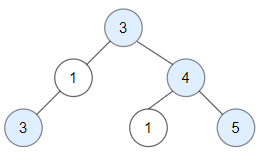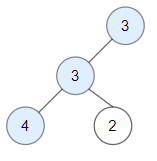1448. Count Good Nodes in Binary Tree
Given a binary tree root, a node X in the tree is named good if in the path from root to X there are no nodes with a value greater than X.
Return the number of good nodes in the binary tree.
Example 1:

Input: root = [3,1,4,3,null,1,5]
Output: 4
Explanation: Nodes in blue are **good**.
Root Node (3) is always a good node.
Node 4 -> (3,4) is the maximum value in the path starting from the root.
Node 5 -> (3,4,5) is the maximum value in the path
Node 3 -> (3,1,3) is the maximum value in the path.Example 2:

Input: root = [3,3,null,4,2]
Output: 3
Explanation: Node 2 -> (3, 3, 2) is not good, because "3" is higher than it.Example 3:
Input: root = [1]
Output: 1
Explanation: Root is considered as **good**.Constraints:
- The number of nodes in the binary tree is in the range
[1, 10^5]. - Each node's value is between
[-10^4, 10^4].
# @lc code=start
using LeetCode
function good_nodes(root::TreeNode)::Int
dfs(::Nothing, args...) = 0
function dfs(n::TreeNode, mval::Int)::Int
res = 0
(n.val >= mval) && (res += 1)
n_max = max(mval, n.val)
res += dfs(n.left, n_max)
res += dfs(n.right, n_max)
return res
end
return dfs(root, typemin(Int))
end
# @lc code=endgood_nodes (generic function with 1 method)
This page was generated using DemoCards.jl and Literate.jl.



